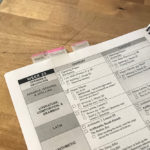
As homeschool moms, we spend our waking hours (and many of our nighttime hours) thinking of ways to ensure our kids don’t hate school.
And when they inevitably decide school isn’t their favorite thing, we begin questioning ourselves:
- Am I expecting too much?
- Does this match their learning style?
- Maybe we should do more orally
- Do they need more hands-on activities?
- Should we join that co-op?
- Should we switch curriculum — even though it’s only November?
We then jump into action, re-evaluating educational methods, stalking homeschool curriculum websites, and asking complete strangers on the other side of the country what they’re using that has their kids jumping for joy when school is announced each morning.
I’ve done it.
But have you ever noticed that when our kids hate school, we start expecting less from them while expecting more from ourselves?
Why are we so willing to turn our homeschools upside down when our kids don’t like what we’re doing?
Because we’re afraid. Utterly and completely afraid.
We’ve been trained to think that one of the worst evils that could befall our children is that they will hate learning.
But learning takes work — even when it’s something our kids want to learn. So we try to cover up learning with fun.
It’s the same thing we do to get our kids to eat vegetables, disguising them in everything from smoothies to mac & cheese.
But we’re not talking vegetables here — we’re talking about souls.
Nurturing souls takes work from us and from them. When we disguise that work as fun, we usually end up watering down truth, skimming the surface of things, and never going deeply into anything unless the child okays it.
Is Our Child’s Opinion a Red Flag?
Yes, it can be; but it doesn’t always mean what we think it means (for those who now have “anybody got a peanut” going through their heads…sorry, I couldn’t help it!)
I went through this recently with my 7 year old daughter:
“What part of school do you hate?”
“All of it.”
“What part do you hate the most?”
[squirming on chair] “Math.”
“Why do you hate math?”
“Because it’s too hard and takes a long time.”
“Oh. But you’ve been doing very well with your math lately.”
“But it’s hard.”
“So maybe you’re doing well but it’s taking a lot of work in your brain?”
“Yeah.”
“Well, that usually means we need to practice some more so it doesn’t take your brain so much work. [cue the squirming] We could pull out our flashcards as a warm-up.”
“No, not flashcards.”
“Hmmm…maybe we could check XtraMath like [your brother].”
[Brightening] “Yes!”
“But it would be extra. You still have to do your daily work.”
“Okay!”
She didn’t need a curriculum change, she just needed to build automaticity so her everyday work wouldn’t tax her brain so much.
6 Reasons Kids Hate School
Usually, little changes are all that’s needed to shift my children’s perspective on school. But it’s not always this easy to get to the root of the problem.
Knowledge Gaps & Lack of Mastery
If a child is missing a piece of foundational knowledge, they will hate having to do anything that requires that knowledge.
This doesn’t only happen in cumulative/skills subjects. If a child hasn’t mastered the steps to forming a complete sentence, they will push back on anything that requires them to do that, regardless of what subject it is in.
We’re Beating a Dead Horse
On the other hand, some kids master things more quickly than we anticipate.
If your child has truly mastered a concept (meaning they get it right 90% of the time), shift it to the once-a-week review category and let them move on.
Time
Some kids hate to devote time to anything they didn’t plan for themselves, while others honestly think things take far more time than they actually do.
I have one child who fits both of these descriptions!
When he’s upset because he’d rather be doing something else, I have the chance to teach him the virtue of diligence.
When he’s upset because he thinks it will take too long, I sometimes ask how long he thinks it will take — and then I time him. He’s inevitably surprised that what he thought would take for.ev.er only took 10 minutes (if that!).
It will take awhile, but this method can help reset a child’s understanding of time.
They Don’t Understand the Expectations
We can explain things in the best way possible and still have kids who look at us like we have three heads. (Or maybe it’s just me and I really do have three heads…?)
That’s why it’s so important to give our kids models of what we expect.
Whether it’s a sample paragraph, or some completed long division problems, this single step can prevent tons of frustration for our kids (and ourselves!).
Confidence
This is often related to point number one, lack of mastery; or it can be related to the next point, especially if the child has siblings who are outpacing them in school:
It Really Is Too Hard
A couple of years ago, when my then-9 year old son continued having meltdowns about school, I gave him an online reading/phonics assessment.
He had just turned 9 but tested at an early-mid Kindergarten level in everything — and I was trying to do a first grade literature program with him!
I thought his “too hard” was simply a lack of diligence, especially since he was already working well-below grade level due to reading struggles.
Turns out, it really was too hard. We later discovered he had several hidden physical issues that were interfering with his ability to learn.
After addressing the physical issues and switching to Memoria Press’ Simply Classical program, he began to soar academically. He will likely be able to transition back to Memoria’s main curriculum in the future.
They Aren’t Ready for Independent Work
Not all children are going to be ready for something simply because they’re at the “normal” age for it.
Staying at-elbow is often enough to turn a “hates-school, never-focuses, takes-forever, truant” into a cheerful learner.
They’re Human Beings
When we’ve ruled out the above possibilities, we’re most likely dealing with the human tendency to not want to do anything that resembles work.
A friend of mine recently reminded me of this; it’s a consequence of the Fall and gosh knows I deal with it in my own heart. Our kids are no different.
How To Help When Your Kids Hate School
It’s hard to remember these things in the moment, so I created this FREE cheat sheet just for you!




Working through Grade 2 Rod & Staff math with my daughter, she was consistently only getting about 75% of them right, and it took an hour to do her lesson. I tried a number of things, including considering other curricula.
What finally worked was giving her only 1/2 to 1/3 of the problems. It took about a week to notice a change. I thought she needed all the problems for practice, so I had been reluctant to cut anything out. But when she sees that she doesn’t need to do all the work, her attitude is so much better, she concentrates on the problems. Now she consistently gets 80-90% right, with occasional days of 100% of the problems correct. The complete opposite of what I thought was the solution.
Now. If only I could get her to do it faster. We went from math taking 1 hour or more to math taking 45 minutes. Not nearly the improvement there that I had hoped. Oh well!
This is such a great post!! We’ve been dealing with this a lot and this gives me a fresh perspective on it. Thank you!!